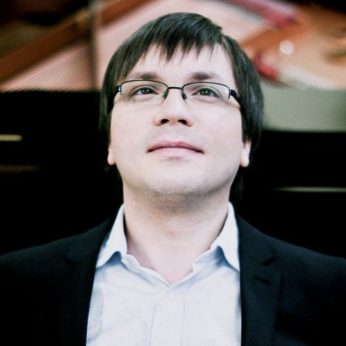Composer: George Enescu (b. 1881 - d. 1955)
Performance date: 28/06/2013
Venue: Bantry Library
Composition Year: 1901/1903
Duration: 00:25:55
Recording Engineer: Damian Chennells, RTÉ lyric fm
Instrumentation: pf
Instrumentation Category:Solo
Artists:
Alexei Grynyuk -
[piano]

The
greatest musical phenomenon since Mozart was
how Pablo Casals described George Enescu. Yehudi Menuhin, who studied
with him, described him as always
propelled by a creative genius whether in speaking, teaching,
conducting, playing the violin, the piano, and, very particularly, in
composing. The
tragedy for those coming after is that he devoted so much of his life
to teaching, conducting and performing, thus neglecting his composing
– he only published 33 works, eighteen of them involving the piano.
Despite his genius he died in poverty, too proud to accept the help
of his friends. One friend tells the story of going to see him in his
spartan room in Paris, where he lived very,
very simply. I asked him one day – this was in the 50s when
rationing was still on – was there anything he wanted, and he said:
‘Yes, a spoonful of jam’.
The
Festival both opens and closes with works by this great Romanian
composer. He entered the exuberant Second Piano Suite in a
composition competition in Paris in 1903 under the pseudonym Des
cloches sonores, itself
a hint of the music to come. The jury consisted of luminaries such as
Cortot, Debussy, Hahn and Pierné, and they awarded the incognito
young composer both the category prize and the Pleyel prize for best
piano piece, thus earning him a grand piano. Like the First Piano
Suite, which appears later in the Festival, this work is a recreation
of Baroque models that also pays homage to both Chopin and Fauré.
The
rare tempo indication Majestueusement
gives a good idea of
the rich organ sonorities of the Toccata,
luxuriating in
harmonic changes and long phrases. Constant change of movement and
flow confer an improvisational character on the Sarabande
and Pavane.
The trilled theme of
the latter marked quasi
flûte has a
typically Romanian character, reminiscent of the doina,
a sad song of
longing found in Romanian folklore. Its closing bars vanish into the
ether in vivid contrast to the lively, down-to-earth dance that
follows.
Copyright © 2025 West Cork Music. All rights reserved.
Designed and developed by Matrix Internet